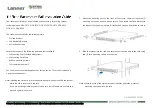
2-1
2
QoS Configuration Approaches
This chapter covers the following topics:
z
QoS Configuration Approach Overview
z
Configuring a QoS Policy
QoS Configuration Approach Overview
Two approaches are available for you to configure QoS: policy-based and non policy-based.
Some QoS features can be configured in either approach while some can be configured only in one
approach.
Non Policy-Based Configuration
In the non policy-based approach, you configure QoS service parameters without using a QoS policy.
For example, to rate limit an interface, you can use the line rate feature to directly configure a rate limit
on the interface rather than using a QoS policy.
Policy-Based Configuration
In the policy-based approach, QoS service parameters are configured through configuring QoS policies.
A QoS policy defines what QoS actions to take on what class of traffic for purposes such as traffic
shaping or traffic policing.
Before configuring a QoS policy, be familiar with these concepts: class, traffic behavior, and policy.
Class
Classes are used to identify traffic.
A class is identified by a class name and contains some match criteria for traffic identification. The
relationship between the criteria is AND or OR.
z
AND: A packet is considered as belonging to a class only when the packet matches all the criteria
in the class.
z
OR: A packet is considered as belonging to a class if it matches any of the criteria in the class.
Traffic behavior
A traffic behavior defines a set of QoS actions to take on packets, such as priority marking and traffic
redirecting.
Policy
A policy associates a class with a traffic behavior to define what actions to take on which class of traffic.
You can configure multiple class-behavior associations in a policy.
















































